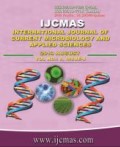


 National Academy of Agricultural Sciences (NAAS)
National Academy of Agricultural Sciences (NAAS)

|
PRINT ISSN : 2319-7692
Online ISSN : 2319-7706 Issues : 12 per year Publisher : Excellent Publishers Email : editorijcmas@gmail.com / submit@ijcmas.com Editor-in-chief: Dr.M.Prakash Index Copernicus ICV 2018: 95.39 NAAS RATING 2020: 5.38 |
One of the major public health issues of the twenty-first century is the prevalence of type 2 diabetes which is rising in both developed and developing nations. It has been established that postprandial hyperglycemia strongly depends on the absorbed monosaccharides and the velocity of absorption in the small intestine and it is mediated by carbohydrates hydrolyzing enzymes such as alpha-amylase and alpha-glucosidase. One of the therapeutic approaches for decreasing of blood glucose rise after a meal is to retard the absorption of glucose by inhibition of alpha-amylase and alpha-glucosidase. Owing to side effects synthetic drugs used to control postprandial hyperglycemia, research for new group of agents from natural resources especially from traditional medicines became an alternative approach for the treatment of postprandial hyperglycemia. Hence the current study was conducted with the main purpose of the phytochemical screening and determination of in-vitro alpha-amylase inhibition activity of rhizome extract of Curcuma longa. Results delineated that major phytochemicals found in aq. extract of rhizome of C. longa were found to be alkaloids, flavonoids, saponins, phenolic compounds, and tannins. Furthermore, results of quantitative estimation of aq. extract of rhizome of C. longa delineated that total phenolic quantity was found to highest (36.34 GAE) followed by total flavonoids (21.46 GAE), and quantities of tannins (4.82 GAE). The IC50 value exhibited by standard (Acarbose) and aq. extract of rhizome of C. longa was found to be31.23 µg/ml and 51.28 µg/ml respectively. In conclusion, results of the present study clearly demonstrated that aq. extract of rhizome of C. longa exhibited alpha-amylase inhibition with IC50 value 51. 28 μg/ml which was comparable with that of the IC50 value of standard Acarbose. Therefore, the present study demarcated that aq. extract of rhizome of C. longa would prove to be a probable drug molecule for the treatment of postprandial hyperglycemia.
 |
 |
 |
 |
 |